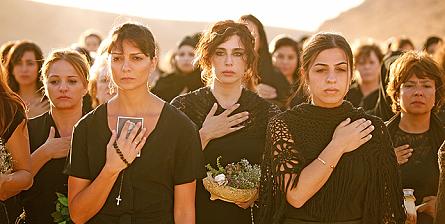Paolo here back with...wait, there are more movies after the awards were announced? Yes, but before we get to that, I was unfortunately reminded by Amir that I saw Love and Bruises. It's a movie about a Chinese woman in Paris named Hua who studies the women's rights movements but hangs around with rapists outside of campus. One of these, Mathieu (Tahar Rahim, who needs to work with better directors), is the jealous possessive type but lets her alone with his skeezy best friend. Cheery stuff.
 Silver Cliff
Silver Cliff
Aarim Ainouz' SILVER CLIFF begins with Djalma (Otto Jr.), a beefy guy who isn't having fun despite swimming on a beach in Rio de Janeiro and making love to his wife Violetta (Alessandra Negrini). He flies to a smaller city and dumps her over the phone. Arriving at the airport too late, she roams around the city, from hotels to beaches, playing his voice message and suspicious of its tone. She meets a father (City of God's Thiago Martins) and daughter with their own back story.
Rio is a city where Brazilians can get willingly lost and here we follow the abandoned halves of broken marriages in Silver Cliff. Though the majority of the film concentrates on Violetta, her scenes neither written nor performed compellingly, Ainouz's choice to begin and end with the male characters is a puzzler.
The People's Choice Winner...
 Where Do We Go Now?
Where Do We Go Now?
After the screening of Nadine Labaki's WHERE DO WE GO NOW? (Lebanon's Oscar Submission), I overheard a festivalgoer telling his friends that 'someone's probably blogging that this is the worst People's Choice Winner ever.' I might be one of those bloggers misconstrued as writing that.
The film's chief merit is its female perspective on Lebanese sectarian conflict. In the spirit of "Lysistrata," a group of village women try to stop men from gunned conflict through pranks. (Some audiences might see this approach as too idealistic since it's difficult for any group who hate each other and unite and pull off miracles.) The director also stars as Amale (Labaki) whose character arc takes her from merely vulnerable and beautiful to someone who can publicly question notions of masculinity and God. But why did the idealistic women have to hire those big city Ukranian exotic dancers? By exploiting them for the men's use these women are taking steps back as they try to move forward. Where Do We Go Now? would have been more effective with less of its irreverent comic tone and musical numbers which only work half the time. The film could still reach the same denouement without trying so hard for its laughs.